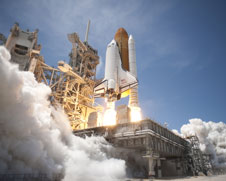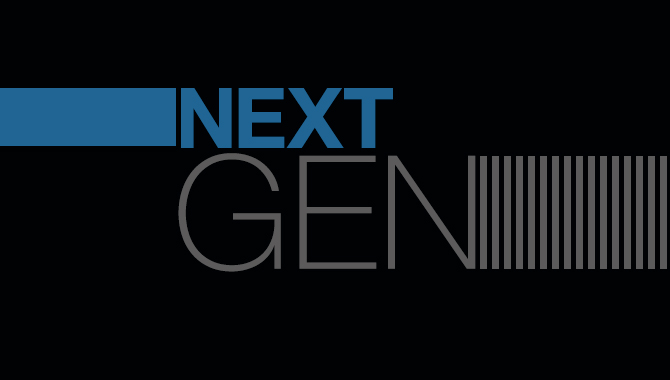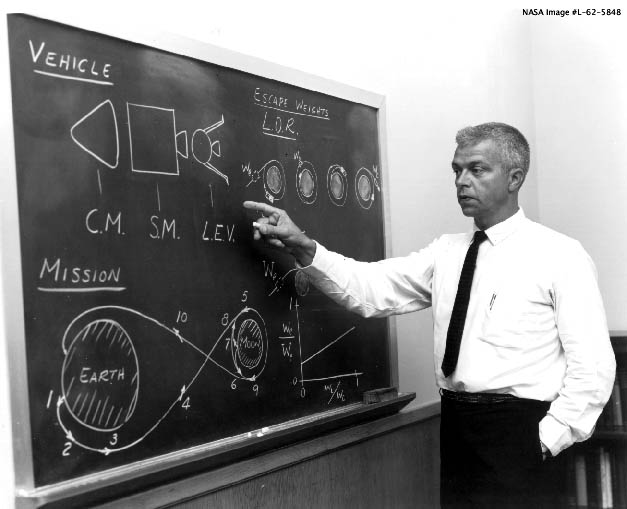June 30 2010 Vol. 3, Issue 6
Master practitioners shared lessons and stories from their work on the Shuttle and Constellation programs at Masters Forum 19.

An exhaust plume surrounds the mobile launcher platform on Launch Pad 39A as Space Shuttle Atlantis lifts off on the STS-132 mission. Credit: NASA/Tony Gray and Tom Farrar
Masters Forum 19 brought together current master practitioners and NASA veterans to participate in sharing knowledge gained from the Shuttle and Constellation programs.
“Here you are today, but tomorrow is going to be different,” said Tom Moser, who hosted a panel on the formulation, development, and operations of the Space Shuttle Program. Panelists included Jody Singer, deputy project manager of the Shuttle Propulsion Office and deputy manager of the Ares Project Office at Marshall Space Flight Center; Russell Rhodes, Kennedy Space Center; and John O’Neill, former director of Space Operations at Johnson Space Center. Singer addressed the importance of testing and requirements. “You must understand what you must do and what you can do,” she said.
O’Neill remarked that things have changed since his career began, “but you still have the same dedication, discipline, and experience.” However, he expressed concern about the future of mission operations. “If you put that capability aside, it’s going to deteriorate…and you can’t rebuild it overnight.”
Tommy Holloway, former program manager of the International Space Station at Johnson Space Center, emphasized the importance of building fundamental knowledge. “Learning while you’re in a low-risk situation is extremely important,” he said, referring to how the Gemini missions provided critical knowledge for Apollo and how the Shuttle-Mir program paved the way for the ISS. He also shared his four pillars of success: 1) the right attitude; 2) technical excellence; 3) character and integrity; and 4) humility, which he characterized as: “You’re not as smart as you think you are.”
The forum also covered the lessons from the first Hubble Space Telescope repair mission. Joe Rothenberg, former associate administrator for Space Flight and director of Goddard Space Flight Center, said his major lessons learned included recruiting good people, making stakeholders full partners, performing independent reviews, and not predicting success. When working a major failure, “you really get a lot of help,” he said. “[NASA] won’t let you fail.”
Phil Sumrall, advanced planning manager for the Ares Project Office at Marshall Space Flight Center, shared his insights about establishing firm requirements early in a program. “A lot of people mistakenly think that if you have a box of parts, you have a vehicle,” said Sumrall. “Putting all of those things together is tough.”
The conversation also turned to political savvy. Presidents set the tone for what happens in human space exploration, said Noel Hinners, former director of Goddard Space Flight Center, and “the ability to foresee and advocate what you wanted to do was well in place in the ’50s.” In the face of potential shutdown of the Shuttle Program during the Carter administration, NASA was replanning the program every year, added Moser. NASA had to continuously sell its program. “This doesn’t sound like engineering,” he said, “but if you don’t do it, [your work] doesn’t get done.”
“I don’t think you’ll ever change politicians,” said Tommy Holloway. “They are what they are and they’ll do what they’ll do. You have to change how you operate with the politicians.”
The forum also explored the life sciences and microgravity research happening on the ISS. Howard Ross, associate center director for planning and evaluation at Glenn Research Center, spoke about ISS microgravity research, which tackles questions like how a candle burns in zero g, how to use space technology to detect cataracts, and how to develop of better firefighting methods. “We can talk about all of the practical benefits, practical science, and incredible engineering, but there is an intangible benefit to what we do,” said Ross.
Future ISS utilization was another hot topic. “It’s one thing to build the ISS. It’s another to actually use it,” said Mark Uhran, of the Office of Biological and Physical Research at NASA Headquarters. Uhran discussed future findings for the ISS, focusing on a highly anticipated treatment of the bacterium Methicillin-resistant Staphylococcus aureus (MRSA). Millard Reschke, Chief Neuroscientist at NASA, presented the effects that gravity (and lack thereof) has on human perception, health, and function, wowing the forum with findings and videos of the atypical behaviors of astronauts returning from space. “Test what you fly, fly what you test, and hopefully you test what you’ve flown,” said Reschke, referring to astronauts.
For an international perspective, Martin Zell, head of the ISS Utilization Department of the Human Spaceflight Directorate at the European Space Agency, discussed the benefits of the ISS. While ESA is also in a transition phase due to the retirement of the shuttle, he said, non-ISS partners should be invited to use the ISS in order to further global human space exploration.
Other speakers discussed the lessons from Spacelab, the Orion capsule, safety oversight and insight, and risk management. Forum participants also viewed the launch of STS-132, the last flight of the space shuttle Atlantis, on May 14, 2010.







